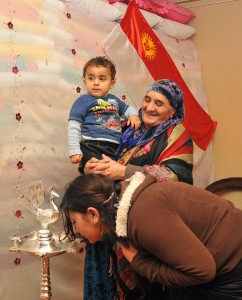Sunday Times 2
Armenia’s Yezidi venerate Satan, seek social mobility
ZOVUNY, Armenia (AFP) – As she hangs up washing on branches outside her family’s stone home, Liana talks wistfully about her curtailed childhood which ended with marriage at the tender age of 14.

Liana hangs up washing outside her family's stone home,
Liana belongs to Armenia’s roughly 40,000-strong Yezidi community, a livestock-herding people who follow their own ancient religion that involves the worship of a peacock angel called Satan.
Their customs are strict and sometimes at odds with the values and practices of the modern world, most notably the tradition of marrying women while they are still in their early teens.
Some within the community, especially the young, are now wanting to break out of the limits of tradition and forge normal lives and careers.
“When I was 14 my parents refused to let me go to school anymore and married me off instead,” Liana, now 23, said, her olive green eyes flickering timidly to the ground.
“But I want my daughters to get an education, become experts in something and live in better conditions,” she said, watching as her six-year-old daughter continued with the household chores.
The Yezidi are the biggest minority group in Armenia — a largely mono-ethnic country where some 98 percent of the roughly 3.3 million population are ethnic Armenians and the country’s Christian Apostolic Church dominates.
Fierce guardians of their traditions, the Yezidi do not allow outsiders to convert to their faith and ban the eating of lettuce or wearing of anything blue.
Although they speak a form of Kurdish, Armenia’s Yezidi fiercely reject being labelled Kurds and their religion — which has seen them regarded as “devil-worshippers” by Muslims — is thought by some to have its origins in the Zoroastrianism of ancient Persia.
The Yezidis do not believe in heaven or hell, and do not regard Satan as evil. In fact, they worship him in the guise of a peacock angel whose name they are forbidden from saying out loud.
Found in Armenia’s western valleys close to Mount Ararat, as well as in their spiritual home in nearby Iraq, along with Syria, Turkey and Georgia, the strongly patriarchal Yezidi forbid girls from talking in the presence of male elders or eating with male relatives.
As was the case with Liana, they have commonly married off their daughters when they are in their early teens, sometimes as young as 12 or 13.
‘A spinster at 18′
Last year when Armenia moved to revise its law on marriage, raising the minimum age of marriage for both boys and girls to 18,

A young woman, member of Yezidi community, kisses a figure peacock angel called Satan, used as an object of worship by the Yezidis. AFP
representatives of the Yezidi community erupted in protest at what they claimed was an assault on a cornerstone of their culture.
“This is an ancient tradition,” said Aziz Tamoyan, the director of the Yezidi Union in Armenia. “If a girl is not already married by the time she is 18 then she is already considered a spinster.”In the end, in the face of possible street protests, Armenia’s parliament compromised and the minimum age that girls in the Yezidi community could marry was set at 16.
“When we brought in changes to the law we had to deal with the realities of life,” said lawmaker Agvan Vardanyan, a member of parliament’s commission for human rights that drew up the law.
“The Yezidi community guards its traditions very jealously and they have families at a very young age whatever the current laws are at any given time,” Vardanyan said.
“Not to take into account their traditions or their rhythm of life would not be right.”But not everyone in the Yezidi community thought that an exception should be made for them.
Many in the younger generations are increasingly turning their backs on their ancestors’ way of life by refusing to have many children, herd livestock or wear traditional clothing.
Although the number is still small — just around 100 — Yezidi students are now studying at Armenian universities, said Khdr Hajoyan, the editor of a Yezidi newspaper named after their fabled homeland, Yezidkhana.
“Young Yezidi boys and girls want to go to school, receive higher education and rise up the career ladder,” Hajoyan said.
“Why can’t someone from the Yezidi community here become a member of parliament or a minister?” he asked.
For a growing number of younger Yezidi though, the dream of a better future lies outside the country — and the strict cultural codes of their closed society.
Many have already emigrated to Europe or Russia and ever more are looking to follow them — including Liana and her young family.
“We don’t have a problem with Armenia but I don’t want my daughters to have the same life as their mother has had,” said Aziz, Liana’s husband.
“I don’t want them just to be working with cattle all their lives,” he said. “Whatever they want to be, that is for them to decide. I don’t want to interfere.”
Follow @timesonlinelk
comments powered by Disqus

